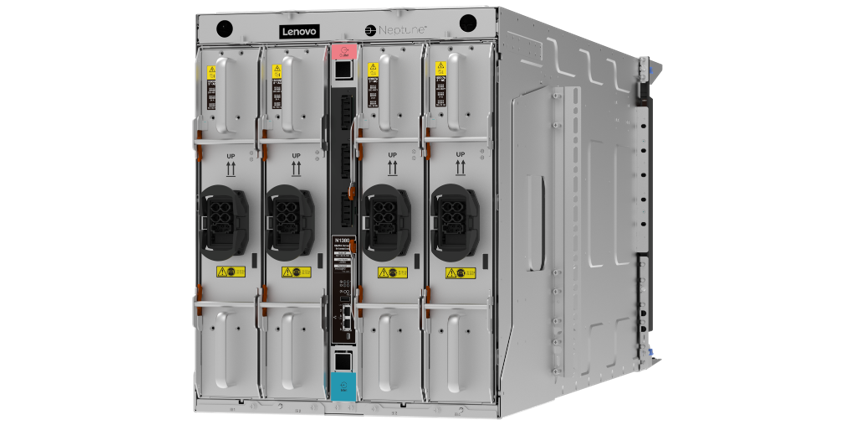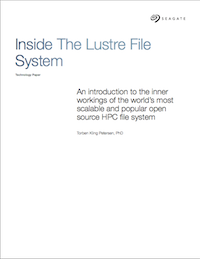 This Q&A was conducted by Nages Sieslack of the ISC 2022 organizing team who spoke with Noam Rosen, Managing Director for High Performance Computing at Lenovo EMEA. Lenovo will be exhibiting in person at ISC 2022 in Hamburg from May 30 to June 1. Their full list of activities at the event is listed here.
This Q&A was conducted by Nages Sieslack of the ISC 2022 organizing team who spoke with Noam Rosen, Managing Director for High Performance Computing at Lenovo EMEA. Lenovo will be exhibiting in person at ISC 2022 in Hamburg from May 30 to June 1. Their full list of activities at the event is listed here.
Nages Sieslack: What was the impetus behind Lenovo’s new TruScale HPC as-a-service and tell us what sets it apart from HPC as-a-service offerings from other OEMs?
Noam Rosen: Cloud-based HPC is the fastest-growing segment of high-performance computing representing a noteworthy 18 percent growth over 2020, according to recently released research from Hyperion. This growth is partly due to the significant upfront investments HPC requires, and because the ever-increasing power and performance of these systems tends to become redundant more quickly than other commercial systems. It’s also because some customers are looking for greater flexibility to achieve a better return on their investments. The typical HPC cluster runs at nearly full capacity, with rapidly increasing demands for computing and storage cycles and little room for unpredictable workloads. By having an on-demand resource based on consumption, the customer can have efficient and scalable computing resources to meet their unexpected workload requirements. That is why we at Lenovo, as the #1 Supercomputer provider on the TOP500, decided to extend our TruScale service to HPC customers to assist those that prefer such an on-demand business model.
Lenovo TruScale High Performance Computing as a Service (HPCaaS) offers organizations of all sizes the flexibility they need to stay competitive with scalable, end-to-end solutions with a cloud-like consumption model and predictable payment options for hardware and services. The simple, comprehensive platform enables organizations to maximize their return on investment and accelerate time to value. TruScale HPCaaS gives customers the flexibility to add provisioned resources rapidly, without being hindered by procurement delays or supply chain disruptions.
What differentiates Lenovo from traditional cloud providers who enable HPC in the cloud is that we will initially offer our customers the technology solution that is installed onsite at their premises, and which will allow them to dynamically access and provision HPC resources completely on-demand. They will be able to provision resources through “push-button” access, to allow them to utilize additional computing, storage, and acceleration capabilities as needed while offering high levels of control and security with on-premise deployment. This TruScale HPC will provide seamless, protected access to data without any changes to job scripts, or potential risks associated with public cloud exposure. Lenovo’s dedicated professionals ensure that data is secure from installation to utilization and through decommissioning. These capabilities are delivered in a highly cost-effective offering, while still enjoying Lenovo’s experience designing HPC ExaScale ready systems for ‘Everyscale’ type of customer.
Sieslack: What are your expectations for revenue growth over the next few years for TruScale versus your traditional on-premise offerings?

Lenovo’s Noam Rosen
Rosen: We believe that the HPC market will continue to do well since more and more countries and companies around the world continue to invest in research to generate more innovation to advance their economies, stay competitive, and help solve humanity’s greatest challenges. So, whilst we do recognise and expect growth for HPC with such a new kind of consumption model, and TruScale will take a fair share of it, we also expect the on-premise Lenovo HPC business to continue and grow too. Some of our long-term Supercomputer customers are themselves providing HPC computing resources to many universities and industrial customers. In essence, they have been doing a kind of HPC as a service long before this acronym was invented. However, with TruScale HPCaaS, Lenovo customers will still be able to enjoy on-premise HPC but consume it in an on-demand model if they wish to do so.
It’s important to remember that some of the companies that are thinking of moving their HPC workloads to the cloud may have similar concerns as traditional IT customers had a few years ago when weighing up whether to move their workloads off-premise – especially if they had already invested in building out their on-premise HPC infrastructure. Those customers, using TruScale, would benefit from both worlds. They will gain more flexibility in consuming HPC resources on demand while doing it on-premise.
Sieslack: What have been some of the supply chain challenges Lenovo has encountered during the Covid pandemic and what lies ahead?
Rosen: The shortages are a sector-wide issue across PCs, data centers, mobile technologies and the automotive industry. Our goal was and is to ensure supplies meet the growing demand by working closely with partners and actively seeking multiple sources. We also take the opportunity to offer like-for-like alternatives that meet customer specifications. Even though we believe we have beaten the competition with the strength of our supply chain operations, a gap remains compared to demand. Lenovo’s strength was demonstrated well during the Covid pandemic which wasn’t only a challenge from a supply chain perspective, but also to mobilize resources to handle large-scale HPC installations. Nevertheless, Lenovo was among the first in the industry to deliver new HPC technology from Intel and Nvidia to customers in Europe and install and accept those systems on time with high customer satisfaction.
Sieslack: With regards to your presence in ISC 2022, what can the attendees expect to see?
Rosen: At ISC2022, attendees engaging with Lenovo will be able to explore the evolution and potential of Exascale computing technologies that fit ‘everyscale’ customers. As the leader in energy-efficient performance computing with the most comprehensive water-cooling solutions in the industry, attendees will learn how Lenovo successfully tackles grand challenges like performance and sustainability. Attendees will be able to meet face to face with Lenovo HPC and AI experts, experience cutting-edge technology, hear from researchers and Lenovo partners from around the world, and discover what tomorrow’s IT will look like.




